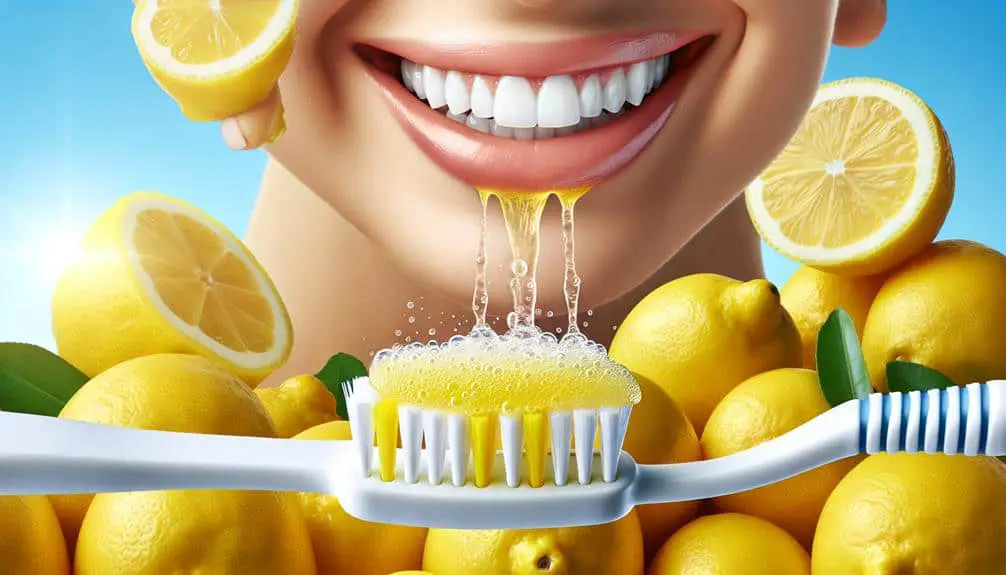Lemon juice can help you achieve brighter teeth by utilizing its natural bleaching properties due to citric acid content. The acidity in lemon juice combats stains and bacteria effectively, offering a natural solution to enhance your oral health. Additionally, the antibacterial benefits of lemon juice assist in maintaining gum health by reducing harmful bacteria in the mouth. This citrus fruit also freshens breath by neutralizing odors and prevents teeth stains, making it a valuable addition to your oral hygiene routine. Incorporating lemon juice into your dental care can provide you with a brighter smile and improved oral health overall.
Key Points
- Citric acid acts as a natural bleaching agent, reducing teeth stains.
- Vitamin C in lemon juice boosts gum health and prevents gum disease.
- Lemon juice's antibacterial properties maintain gum health and prevent infections.
- Freshens breath by neutralizing odors and prevents teeth stains.
- Natural bleaching properties in lemon juice brighten teeth and reduce bacteria.
Citric Acid for Teeth Whitening
To effectively whiten your teeth using citric acid, it's essential to understand its role in breaking down stains and brightening your smile. Citric acid, found in citrus fruits like lemons, works as a natural bleaching agent due to its acidic nature.
However, it's important to take acidic precautions when using citric acid for teeth whitening. The acidity can erode tooth enamel if not used properly. To prevent this, it's recommended to dilute lemon juice with water before application.
Furthermore, individuals with citrus sensitivity should be cautious when using citric acid for teeth whitening. Some people may experience sensitivity or irritation in their gums or teeth when exposed to citric acid. It's advisable to perform a patch test before applying citric acid directly to your teeth to check for any adverse reactions.
Vitamin C Boosts Oral Health
Boosting oral health, Vitamin C plays an essential role in maintaining healthy gums and teeth. Vitamin C, also known as ascorbic acid, is vital for supporting oral hygiene by promoting gum health. This powerful antioxidant aids in the repair and growth of tissues throughout the body, including the gums. By consuming an adequate amount of Vitamin C, you can help prevent gum disease and maintain strong teeth.
Research indicates that Vitamin C deficiency can lead to weakened gums, making them more susceptible to infections and inflammation. Incorporating Vitamin C-rich foods such as citrus fruits, strawberries, bell peppers, and broccoli into your diet can greatly contribute to your overall gum health. Additionally, Vitamin C helps in the production of collagen, a key protein for maintaining the strength and structure of gums.
To improve your oral health and support gum health, make sure you're getting enough Vitamin C either through your diet or supplements. By prioritizing your Vitamin C intake, you're taking a proactive step towards healthier gums and teeth.
Natural Bleaching Properties
In addition to supporting gum health, lemon juice's natural bleaching properties can contribute to achieving brighter teeth. The citric acid in lemon juice has mild bleaching effects that can help reduce stains on teeth, giving them a whiter appearance. When looking for home remedies or DIY solutions for teeth whitening, incorporating lemon juice can be a cost-effective and natural option.
- Lemon Juice and Baking Soda Paste: Mixing lemon juice with baking soda creates a paste that can be applied to the teeth to help remove surface stains.
- Lemon Peel Rub: Gently rubbing the inside of a lemon peel on your teeth for a few minutes may help brighten your smile.
- Lemon Juice Mouthwash: Diluting lemon juice with water to create a mouthwash can assist in reducing bacteria and stains in the mouth.
- Lemon Juice and Coconut Oil Pulling: Combining lemon juice with coconut oil for oil pulling can aid in removing plaque and stains from teeth.
When using these DIY lemon juice methods, it's important to be cautious as excessive use can erode tooth enamel over time.
Antibacterial Benefits for Gums
With its natural antibacterial properties, lemon juice can help maintain gum health by combating harmful bacteria in the mouth. Gum health is essential for overall oral hygiene, as gum diseases can lead to various issues such as inflammation, bleeding, and even tooth loss. Lemon juice, with its antimicrobial properties, can assist in reducing the bacterial load in the oral cavity, thereby contributing to healthier gums.
When incorporated into your oral hygiene routine, lemon juice may help prevent the growth of bacteria that can cause gum infections. However, it's important to use lemon juice in moderation and to dilute it with water to prevent the acidic nature of the juice from damaging the tooth enamel. Additionally, remember that lemon juice shouldn't be a substitute for regular brushing, flossing, and professional dental cleanings.
Freshens Breath and Prevents Stains
Combat bad breath and prevent teeth stains by harnessing the freshening properties of lemon juice in your oral care routine. Lemon juice can be a natural and effective addition to your oral hygiene practices. Here are some key benefits to incorporating lemon juice in your routine:
- Natural Freshener: Lemon juice's tart taste helps to freshen your breath by neutralizing odors.
- Stain Prevention: The acidity in lemon juice can help prevent the buildup of stains on your teeth, keeping them brighter.
- Antibacterial Properties: Lemon juice has antibacterial properties that can help combat bacteria in the mouth, promoting overall oral health.
- Saliva Stimulation: The tartness of lemon juice can stimulate saliva production, which is essential for maintaining a clean and healthy mouth environment.
Frequently Asked Questions
Can Lemon Juice Be Used as a Substitute for Professional Teeth Whitening Treatments?
Lemon juice can't replace professional whitening treatments. While it may have some effectiveness, its limitations include potential enamel erosion and lack of significant whitening power. Consider consulting a dentist for safe and efficient alternatives.
Are There Any Potential Risks or Side Effects of Using Lemon Juice for Teeth Whitening?
Using lemon juice for teeth whitening may pose potential risks due to its high acidity. Side effects may include enamel erosion, leading to oral health issues. It is important to be cautious when using acidic substances on your teeth.
How Often Should Lemon Juice Be Used to See Noticeable Results in Teeth Whitening?
Wondering how often lemon juice should be used to achieve whiter teeth effectively? For best results, use lemon juice sparingly, about once a week. Consistent but controlled usage helps prevent enamel erosion while brightening your smile.
Are There Any Specific Precautions to Take When Using Lemon Juice on Teeth?
When using lemon juice on teeth, precautions are are essential. Proper application techniques include diluting the juice to reduce acidity, using a straw to minimize contact with teeth, and rinsing thoroughly to prevent acid erosion.
Can Lemon Juice Be Used in Combination With Other Natural Remedies for Teeth Whitening, Such as Baking Soda or Coconut Oil?
Sure, you can mix lemon juice with strawberries for teeth whitening. However, using lemon juice with turmeric may stain your teeth. It's important to research and consult a dental professional before trying DIY remedies for teeth whitening.




